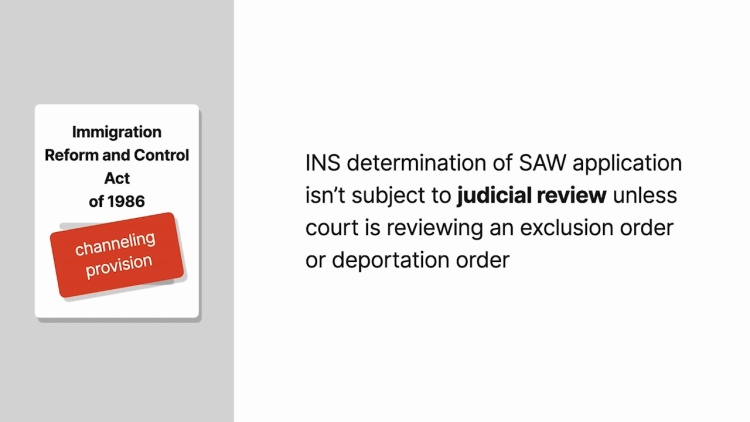McNary v. Haitian Refugee Center, Inc.
United States Supreme Court
498 U.S. 479 (1991)
- Written by Robert Cane, JD
Facts
The Immigration Reform and Control Act of 1986 (Reform Act) established two amnesty programs for undocumented aliens. Immigration and Naturalization Services (INS) (defendant) administered the programs. One of the programs, the Special Agricultural Workers (SAW) program, granted temporary residence and, later, permanent residence for any alien farmworkers who could prove they had performed at least 90 days of qualifying agriculture work in the past year and were eligible for admission to the United States. Aliens filed an application under the SAW program with the Legalization Office of INS. The Legalization Office either denied or granted the application. The initial denial could be appealed to the legalization appeals unit for a final administrative decision. The Reform Act § 302, through its reference to the Immigration and Nationality Act (INA) § 210, prohibited “judicial review of a determination respecting an application for adjustment of status” except in limited circumstances related to deportation orders. The Haitian Refugee Center, Inc.; the Migration and Refugee Services of the Roman Catholic Diocese of Palm Beach; and 17 unsuccessful SAW applicants (plaintiffs) challenged INS procedures related to the SAW program in a district court. The district court found in favor of the SAW applicants. INS appealed, and the appellate court affirmed the district court ruling. INS then appealed to the United States Supreme Court.
Rule of Law
Issue
Holding and Reasoning (Stevens, J.)
Dissent (Rehnquist, C.J.)
What to do next…
Here's why 907,000 law students have relied on our case briefs:
- Written by law professors and practitioners, not other law students. 47,100 briefs, keyed to 996 casebooks. Top-notch customer support.
- The right amount of information, includes the facts, issues, rule of law, holding and reasoning, and any concurrences and dissents.
- Access in your classes, works on your mobile and tablet. Massive library of related video lessons and high quality multiple-choice questions.
- Easy to use, uniform format for every case brief. Written in plain English, not in legalese. Our briefs summarize and simplify; they don’t just repeat the court’s language.






